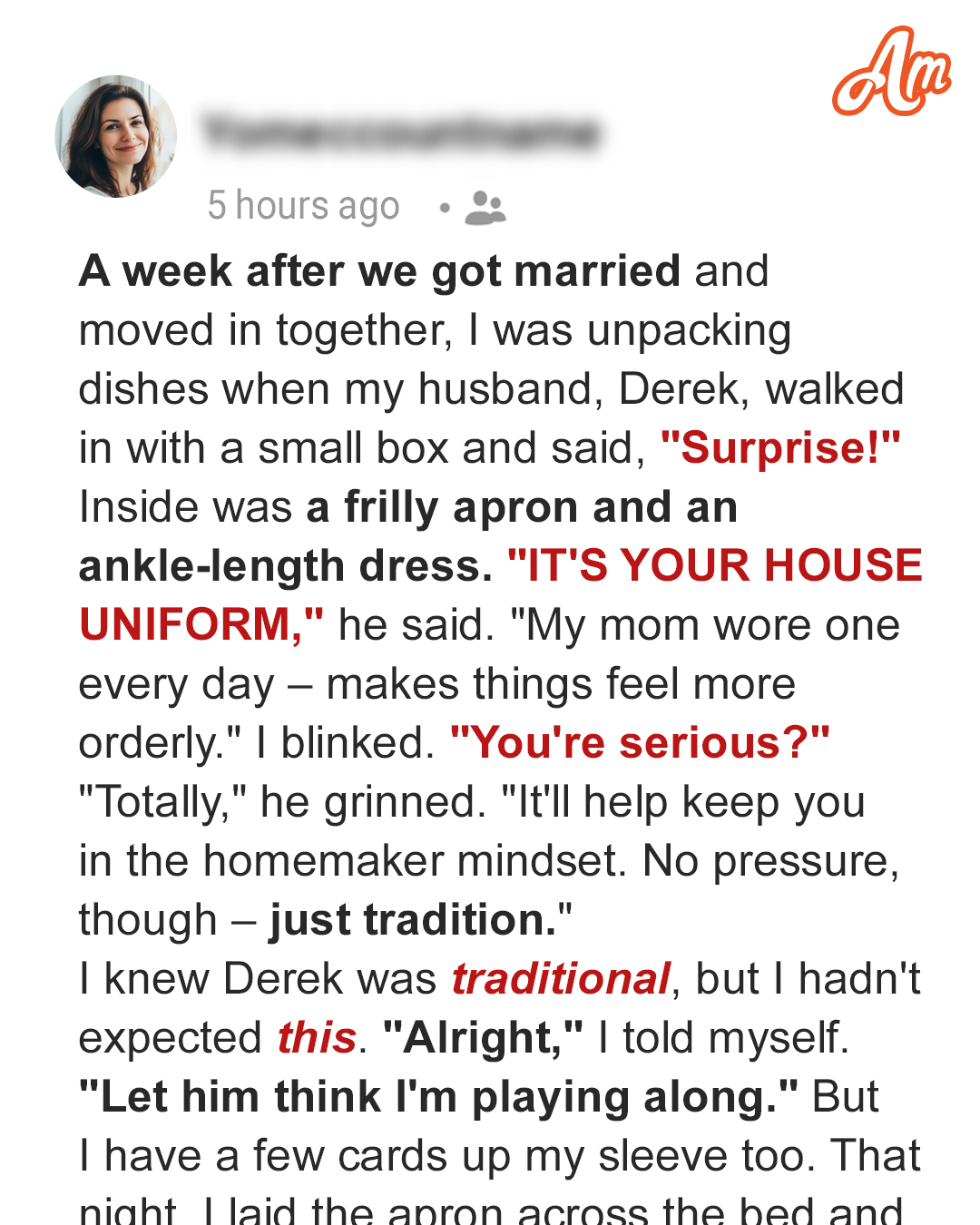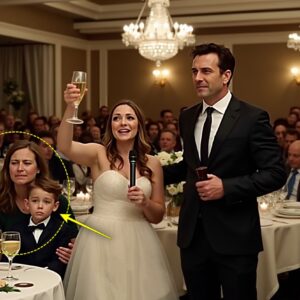
A week after moving in with my new husband, he handed me a frilly apron and called it my “house uniform.” He said it was “just tradition.” I was stunned, but smiled and played along. He thought he wanted a Stepford Wife until I showed him how wrong he was.
One week of marriage, and I was still riding the high of it all: the ceremony, the honeymoon, and now, unpacking our things in our first home.
I heard Derek’s key in the lock, followed by his footsteps down the hall.
“Honey? I’m home,” he called out, his voice carrying that playful edge he got when he was excited about something.
“In the kitchen,” I replied, setting down a crystal serving bowl we’d received as a wedding gift from his aunt.
Derek appeared in the doorway, his suit jacket slung over one shoulder, a smug grin plastered across his face. In his free hand, he held a large box tied with a ribbon.
“Surprise!” He wiggled his eyebrows and extended the gift toward me.
My heart fluttered. We’d agreed no more presents after the wedding, but I couldn’t help the smile that spread across my face.
“What’s this?”
“Open it and see.” He leaned against the counter, watching me expectantly.
I untied the ribbon and lifted the lid.
Instead of jewelry or something thoughtful, I found myself staring at a frilly floral apron folded neatly on top of what appeared to be a dated ankle-length dress.
I blinked, certain I was missing something.
“It’s your house uniform,” Derek announced with undisguised pride. “My mom wore one every day. It makes things feel more orderly.”
I ran my fingers over the cotton apron and eyed the black dress warily. Was “house uniform” another word for Puritan dress? All it was missing was a broad collar and a bonnet.
“You’re serious?” I asked, my voice carefully flat.
Derek doubled down with a wink. “Totally. No pressure, though — it’s just tradition. Helps keep the homemaker mindset, y’know?”
I stared at him, searching his face for any sign he was joking. There wasn’t one.
“I thought it would be a nice surprise,” he added, his tone suggesting I should be thanking him.
“It’s definitely a surprise,” I replied, focusing on keeping my expression neutral.
I couldn’t believe what was happening. This wasn’t what I’d signed up for — but part of me wondered if I should’ve seen it coming.
I met Derek when I was working as a successful analyst. Over our year of dating, he had convinced me I’d love being a homemaker, especially since we both dreamed of having two or three kids in the future.
He assured me his job could support us entirely, that we’d have more than enough.
When I suggested finding remote work, he insisted I’d be happier as a trad wife, that I could rediscover myself, take up new hobbies, and eventually focus on the baby.
I had agreed to give it a try.
But this? This was next level.
“So? What do you think?” Derek prompted.
I took a long, hard look at him. There was a sparkle in his eyes and his smile was as joyful as a child watching fireworks on July 4th. He wasn’t being malicious, just impossibly naive.
“It’s… traditional, you say?” I managed.
His face lit up. “Yeah! This is just like what my mom used to wear.”
“Right. Like your mom.” I closed the box carefully. “I’ll try it on later.”
“Great! I can’t wait to see.” He kissed my cheek and headed to the bedroom to change.
Alright, I told myself. Let him think I’m playing along.
That night, I laid the uniform neatly across our bed. A plan was forming in my mind, and to execute it, I dug out my dusty college-era sewing kit from the back of the closet.
My husband was going to get a wake-up call he’d never forget!
I became a 1950s dream wife overnight.
I wore the dress religiously while making Derek breakfast before dawn, vacuuming in pearls I’d inherited from my grandmother, and scrubbing baseboards on my knees.
“See? Doesn’t it just make everything more pleasant?” Derek beamed on the third morning, watching me flip pancakes while dressed in the full getup.
“Oh, absolutely,” I replied, my voice honey-sweet.
By day five, I wasn’t just playing house; I was performing it to the hilt.
And I’d finished sewing my very barbed and pointed protest. It was a name tag I’d embroidered onto the apron: “DEREK’S FULL-TIME HOUSEWIFE.”
I also started calling Derek “sir.”
“Good morning, sir,” I greeted as he came downstairs. “Your breakfast is prepared. Would you like me to pour your coffee, or would you prefer to do it yourself, sir?”
Derek laughed nervously. “The uniform is enough, honey. You don’t need to call me ‘sir.'”
I tilted my head, expression innocent. “Should I wait by the door at 6 p.m. sharp with your slippers, sir?”
He frowned. “What? No.”
Later that evening, I knocked softly on his office door. “Permission to use the bathroom during my shift, sir?”
Derek’s grin began to falter. “Okay, you don’t have to be sarcastic.”
“Sarcastic? I thought this was tradition.” I gestured at my outfit, complete with the frilly apron and now a pair of white gloves I’d found at a thrift store.
That weekend, Derek’s boss and a few coworkers came over for dinner.
I greeted them in full uniform, opening the door wide, and curtsying almost to the floor as they trooped inside.
“Welcome to our home,” I announced. “The master of the house will be down shortly to greet you.”
“Er… are you Derek’s wife?” his boss, Richard, asked as I took his coat.
I pointed to my nametag. “I am, sir.”
He smiled uncomfortably. “That’s… uh. What did you do before you got married?”
“Oh, I retired my dreams the moment I said ‘I do,'” I replied with a placid smile. “Derek prefers it that way.”
The room chilled. Derek, who had just come down the stairs, turned beet red.
“Honey, didn’t we agree that this… joke had gone a bit too far?” He said as he hurried up to greet his colleagues.
“But I’m not joking, sir,” I replied. “I’m fulfilling my proper role as your wife.”
One of Derek’s coworkers, Anita, narrowed her eyes. “Proper role?”
“The homemaker,” I explained brightly. “Derek believes in traditional values. The apron helps maintain the right mindset.” I smoothed my hands over the frilly fabric. “Isn’t it darling? Just like his mother used to wear.”
Derek’s smile froze on his face. Richard shifted uncomfortably. Anita’s eyebrows practically disappeared into her hairline.
“Is that so?” Richard asked, looking between us.
“Julia has a unique sense of humor,” Derek said weakly.
The dinner crawled by, Derek growing more uncomfortable with each passing minute. I served the meal with mechanical precision and only spoke when spoken to.
After the guests left, Derek exploded.
“What was that?” he demanded, loosening his tie with angry tugs. “You’re making me look like some kind of sexist pig!”
I replied with mock innocence: “Me? I’m just living the dream you picked out for me. Tradition, remember?”
“That’s not what I meant by tradition!” His voice cracked.
“Then what did you mean?” I asked calmly, my smile holding steady. “Because from where I stand, a ‘house uniform’ sends a pretty clear message about your expectations.”
“I just thought… my mom always—” he sputtered.
“Your mom chose that for herself,” I pointed out. “Or, at least, I hope she did. But you chose it for me.”
He ran his hands through his hair. “Fine. I get it. The uniform was too much.”
“The uniform was a symptom,” I corrected him. “I agreed to try things your way when we married, Derek, but I never signed up to be your servant. If that’s what you want, then you should’ve stayed single and hired a housekeeper.”
I hung the apron on a hook in the kitchen.
“I’m never wearing that thing again,” I declared. “And you need to think long and hard about whether you married me because you love me, or because you wanted a replacement Mommy.”
He started to protest, to insist he married me for love, but I walked out of the room and went to bed.
Monday morning came, and Derek kissed me goodbye like nothing had happened. But when he returned that evening, he walked in the door pale and tight-lipped, dropping his keys with a clatter on the entry table.
“Rough day?” I asked from the couch where I sat in jeans and a t-shirt, laptop open on my knees.
“I got called into HR,” he said hoarsely. “Someone took your wife performance very seriously. They asked whether my ‘traditional values’ shaped how I treated women at work. The company is going through some ‘diversity audit,’ and they’re going to be watching me closely.”
I raised my eyebrows, feigning surprise.
“Really? That’s terrible,” I said, not meaning it.
His eyes drifted to the kitchen, where the apron still hung.
“You win,” he said quietly. “I… I saw a lifestyle that looked good on the surface without realizing how harmful it was.”
I closed my laptop. “In that case, we both win. I get to wear pants again, and you’ll get to keep your job. By the way, I decided to get a remote job after all. I started applying to vacancies today.”
For a moment, I thought he might argue. Instead, he nodded slowly.
“I’m sorry,” he said finally. “Mom always looked so happy in her role, I thought…”
“You thought I’d be happy, too, but I’m not her,” I finished for him.
That night, I took the uniform and stuffed it in the back of the closet.
Maybe someday we’d pull it out and laugh about it. Or maybe we’d burn it in the backyard. Either way, a smirk curled my lips as I turned away from the closet.
he scent of victory was sharper than lemon polish, and I wore it better than any uniform he could buy.
Here’s another story: While I juggled sleepless nights and newborn chaos, my husband started coming home “not hungry.” I thought it was stress — until I uncovered what he’d been up to behind my back. I didn’t yell. I didn’t cry. I planned a revenge so delicious he’d never forget.
This work is inspired by real events and people, but it has been fictionalized for creative purposes. Names, characters, and details have been changed to protect privacy and enhance the narrative. Any resemblance to actual persons, living or dead, or actual events is purely coincidental and not intended by the author.
The author and publisher make no claims to the accuracy of events or the portrayal of characters and are not liable for any misinterpretation. This story is provided “as is,” and any opinions expressed are those of the characters and do not reflect the views of the author or publisher.





